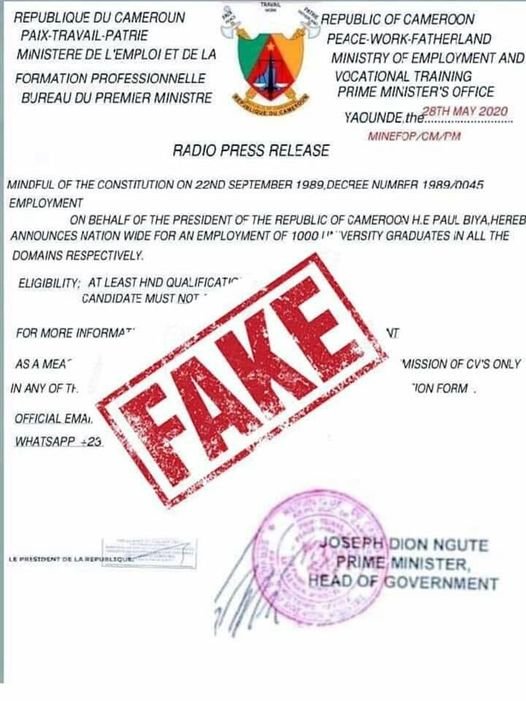By Etienne Mainimo Mengnjo
The recent publication of over 1300 fake certificates discovered during Cameroonian Defense Force recruitment have not only sent shockwaves through the nation but have raise questions with questions blowing in the wind. This wasn’t an isolated incident; the number has grown steadily, swelling from 929 in 2022.

While some expressed surprise, many others saw it as a symptom of a much larger, chronic illness plaguing the education system: the rampant use of fraudulent documents. This isn’t a new problem. For years, fake certificates have cast a long shadow over various sectors healthcare, finance, and more.
While many put the guilt on technology, as a double-edged sword, which has facilitated the creation and distribution of these deceptive documents, some say inflated grades transform into entirely fabricated diplomas, creating a landscape where unqualified individuals game the system, often with seemingly authentic-looking certificates.
The blame game points towards the fierce competition for jobs and opportunities as desperate individuals’ resort to this deception to stand out or qualify for positions they wouldn’t otherwise obtain.
Marable, a concerned citizen, laments, “Technology should be a force for good, but it’s causing harm. These fake certificates are so convincing; only rigorous authentication exposes them.”
Janet’s experience paints a bleaker picture. “The worst part? Some with fake certificates get away with it. Authorities supposedly fighting are the very ones enabling it! I know someone who somehow transitioned from a basic FSLC to an Advanced Level certificate – fictitious credentials used to secure a visa!”
This cynicism isn’t unfounded. Many Cameroonians suspect government officials, while publicly condemning the practice, might hold knowledge of where these documents are fabricated. The reputational damage to the education sector is immense, casting doubt on the legitimacy of all issued certificates.
However, there’s a glimmer of hope. Experts believe that while technology can be a villain, it can also be the hero. Automation of verification systems adds an extra layer of security, while blockchain technology offers a platform for secure credentialing, minimizing the chances of fraud. Employers empowered by such technology can maintain the integrity of their recruitment processes and weed out counterfeit certificates.
Curbing this problem demands a multi-pronged approach. Employers and individuals need to be vigilant, but strong regulations are crucial. As one expert suggests, “Regulatory bodies and the government must establish a framework with harsh penalties for producing and possessing fake certificates.”
Collaboration between government, employers, law enforcement, and workplace development agencies is vital to enforce these regulations and ensure fairness in the job market.
However, the fight doesn’t end there. Experts further say, everybody must address the root causes that incentivize this deception. To them, an education system that prioritizes rote learning over critical thinking and undervalues vocational skills creates a breeding ground for desperation. A curriculum that fosters creativity, problem-solving, and adaptability will empower future generations to succeed on their own merits, rendering fake certificates obsolete.
Eradicating fake certificates is a marathon, not a sprint. Even though this is a global issue, by harnessing technology, strengthening regulations, and fostering a culture of meritocracy, Cameroon can excise this cancerous tumor and ensure a brighter future for its education system. Only then can true talent and hard work flourish, propelling the nation towards a more just and prosperous future.